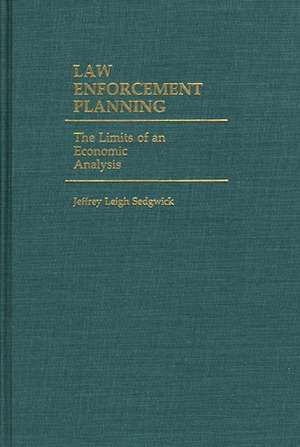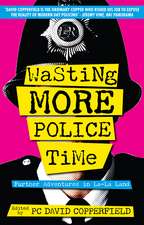Law Enforcement Planning: The Limits of an Economic Analysis: Contributions in Criminology and Penology
Autor Jeffrey L. Sedgwicken Limba Engleză Hardback – 13 dec 1984
Is cost-benefit analysis the best means to determine and formulate public policies? To answer this question Jeffrey Leigh Sedgwick examines its application to crime and criminal justice and the implications of that application. In this interdisciplinary study, Sedgwick first assesses the value of applying economic models to the social problem of crime. He compares economic models to sociological ones and then addresses the question of whether economic models are compatible with the values of a liberal political order. He shows that cost-benefit analysis suffers from technical and ethical problems when used to set law enforcement goals. Current techniques for measuring the costs of crime are crude and unreliable, he argues, and overreliance on citizen and consumer preference may lead to the adoption of policies incompatible with American political traditions and respect for human rights. Sedgwick concludes that economic analysis cannot, by itself, lead to the adoption of effective and publicly defensible policies to combat crime.
Din seria Contributions in Criminology and Penology
- 24%
 Preț: 462.12 lei
Preț: 462.12 lei - 33%
 Preț: 320.50 lei
Preț: 320.50 lei - 51%
 Preț: 305.05 lei
Preț: 305.05 lei - 38%
 Preț: 437.31 lei
Preț: 437.31 lei - 24%
 Preț: 363.06 lei
Preț: 363.06 lei - 51%
 Preț: 366.62 lei
Preț: 366.62 lei - 38%
 Preț: 439.44 lei
Preț: 439.44 lei - 50%
 Preț: 305.61 lei
Preț: 305.61 lei - 33%
 Preț: 321.63 lei
Preț: 321.63 lei - 38%
 Preț: 436.32 lei
Preț: 436.32 lei - 27%
 Preț: 437.31 lei
Preț: 437.31 lei - 24%
 Preț: 468.96 lei
Preț: 468.96 lei - 24%
 Preț: 461.28 lei
Preț: 461.28 lei - 24%
 Preț: 364.06 lei
Preț: 364.06 lei - 42%
 Preț: 272.74 lei
Preț: 272.74 lei - 52%
 Preț: 251.90 lei
Preț: 251.90 lei - 52%
 Preț: 250.77 lei
Preț: 250.77 lei - 38%
 Preț: 344.15 lei
Preț: 344.15 lei - 26%
 Preț: 305.67 lei
Preț: 305.67 lei - 38%
 Preț: 438.17 lei
Preț: 438.17 lei - 28%
 Preț: 344.15 lei
Preț: 344.15 lei - 38%
 Preț: 437.15 lei
Preț: 437.15 lei
Preț: 376.66 lei
Preț vechi: 632.04 lei
-40% Nou
72.08€ • 75.10$ • 59.93£
Carte tipărită la comandă
Livrare economică 10-24 februarie 25
Specificații
ISBN-10: 0313239932
Pagini: 198
Dimensiuni: 156 x 234 x 14 mm
Greutate: 0.49 kg
Editura: Greenwood Press
Colecția Praeger
Seria Contributions in Criminology and Penology













